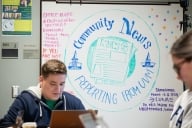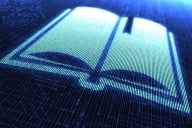You have /5 articles left.
Sign up for a free account or log in.
Paul Courant expected to host representatives from the Authors Guild on his campus for a friendly discussion about some innovative ways his university is distributing digitized content. So he was surprised when they asked instead to see him in court.
Courant, dean of libraries at the University of Michigan, says he had invited representatives from the guild to visit Ann Arbor after a series of amiable exchanges. Michigan, along with several other libraries, decided earlier this summer to make digitized “orphan works” — books whose copyright holders cannot be identified or contacted — available online to the university’s students and faculty, beginning next month.
The question of what’s to be done with digitized orphans is a sensitive one. The Authors Guild is a plaintiff in the years-long Google Books lawsuit, which centered on whether Google could sell access to its trove of scanned “orphans.” A appeals court in March ruled that Google was not allowed to license access to its orphan works.
Michigan facilitated that scanning; the university owes its own trove of digitized literature to a 2004 agreement with Google that left the library with a complimentary digital copy of every book the company scanned from its collection — which is to say, all of it. At the same time that it has garnered praise for its leadership on university-centered digital archiving projects, Michigan has endured criticism for giving Google an early lead.
Still, Michigan and its partners were not looking to sell access to the their orphans — only make the digital versions available to their own students and faculty. So Courant says he did not expect any trouble from the Authors Guild. “We wanted to be as transparent as possible,” he says. “We started talking about dates. And in the middle of all that, this lawsuit materializes.”
The lawsuit, filed Monday by the Authors Guild and several other author groups, accuses Michigan, along with several other major research universities that had originally partnered with Google, of “tak[ing] copyright law into their own hands” by conspiring with Google to illegally scan copyrighted works “for the universities to exploit.”
The suit names Michigan, the University of California, the University of Wisconsin, Cornell University and Indiana University as defendants. It also names HathiTrust, a Michigan-based consortium that mirrors the digitized holdings of 50 research universities in its digital library.
The plaintiffs — which also include the Australian Society of Authors, a Quebecois authors’ association and eight individual authors — want a court order to have the digital copies at those institutions, and in the HathiTrust Digital Library, “impounded” until Congress passes legislation detailing how they may be used.
Fair Use and the (Digital) Library
The university libraries and their supporters say providing digital versions of their existing holdings to authorized patrons is sheltered by the “Fair Use” exemptions to U.S. copyright law. Fair Use, a concept that is not part of the copyright law but has emerged from previous court decisions, provides some legal cover to those who copy works without permission for nonprofit educational purposes.
In a dense analysis published Tuesday, the Association of Research Libraries (ARL) said the HathiTrust’s decision to let faculty and students access digital copies of orphan works holds up well under the four factors courts use to determine Fair Use: The purpose and character of the use (commercial versus nonprofit); the nature of the copyrighted work; the amount of the copyrighted work used relative to the whole; and the effect of the use upon sales or value of the copyrighted work.
“Here, three of the factors favor Fair Use, and one factor, the amount used, is at worst neutral,” wrote Jonathan Band, a prominent D.C.-based open-access lawyer, on behalf of the association. (On the question of “amount used,” he acknowledges that providing full-text copies of copyrighted orphan works “does not favor Fair Use,” but says the law might be sympathetic to the idea that copying an entire copyrighted work is necessary to fully realizing the educational and cultural value of copying the work at all.)
“In the Proposed Use, HathiTrust seeks to increase the access of its members’ faculty and students to lawfully purchased scholarly books that are orphans works,” Band continues. “Copyright’s goal of promoting knowledge is better served by allowing the Proposed Use than by preventing it.”
Paul Aiken, executive director of the Authors Guild, says he does not buy the Fair Use argument. While Fair Use can be applied where U.S. copyright law provides no clear guidance, the guidance that law provides for libraries is clear, he says: libraries may not create and maintain digital copies of their print holdings unless the purpose is to replace a book that has deteriorated and is no longer usable.
Beyond that, “there can be no further distribution of the digital format; and the digital copy ‘cannot be used outside premises of the library or archive,’ ” the guild and its fellow complainants assert in the lawsuit.
But Brandon Butler, director of public policy initiatives for ARL, says the explicit guidelines about library and archive usage written into the law do not mean the Fair Use exemptions do not also apply.
Case law is nevertheless thin in that regard, says Siva Vaidhyanathan, a media studies and law scholar at the University of Virginia. Notwithstanding the high-profile case currently being litigated against Georgia State University over the implications of Fair Use on library e-reserves, “There aren’t a lot of cases about libraries and Fair Use,” Vaidhyanathan says.
Courant says he does not believe there should be a legal distinction between Fair Use in the classroom, where a professor might be permitted to distribute copies of a copyrighted article to students for discussion; and Fair Use in the library, where a student might look up a digitized orphan after seeing it cited in another work or finding it via the online library catalog. In both cases, Courant says, the digital copy is provided as a means to advance knowledge and education, not profit.
Not About Orphans
In an interview, Aiken said the lawsuit was not really about the universities’ decision to provide access to digitized orphans. It is more about the universities’ having approved, and benefited from, Google scanning their entire collections without permission of the copyright holders.
While Aiken said the orphan issue gives the lawsuit "immediacy," the larger concern is that Michigan, California, Wisconsin, Indiana, and Cornell are currently holding ill-gotten digital copies of other in-copyright works — whose copyrights are owned by members of the Authors Guild.
In their court filing, the complainants note that just because the universities are not charging their students and faculty for access to the digitized orphans does not mean they have not profited from their controversial arrangements with Google.
“In light of the high-priced and sophisticated scanning technology and amount of staff required to digitize the works, the digital copies obtained by the universities carry significant economic value,” they assert in court filings. “Prior to Google’s involvement, libraries estimated their cost of digitization at $100 per volume. Thus, the digitization project is measured in the hundreds of million dollars.”
Because they were not given the chance to grant permission, the guild never had the opportunity to negotiate security and usage rules with the libraries, Aiken said. For example, the guild would have required that the HathiTrust be held financially liable if a server was hacked and various works were released to the Web, he said.
The guild sued, Aiken said, because any post facto agreements would not carry the same weight as a court order.
Courant argued that the digital copies of non-orphan works held by Michigan and mirrored in the HathiTrust Digital Library were created for purposes of preservation.
“We believe that making copies [of non-orphan works] for preservation is something we are completely authorized to do, and so far that is all we have done,” he said.
“We’re preserving with them, but we are not displaying them unless the physical copies actually are falling apart,” Courant added.
For the latest technology news and opinion from Inside Higher Ed, follow @IHEtech on Twitter.








